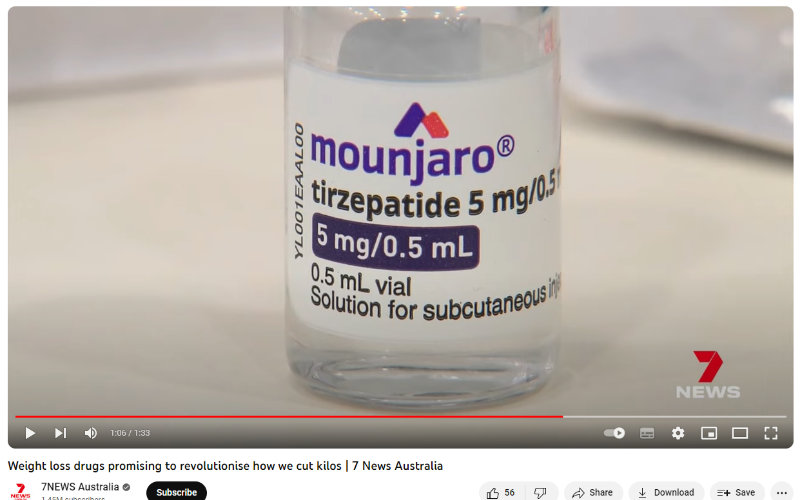It is illegal to advertise prescription drugs in Australia yet Seven News broadcast advertorial for Big Pharma’s latest weight-loss blockbuster Mounjaro and may attract the gaze of the Therapeutic Goods Association. Callum Foote reports.
Seven News aired a one minute and thirty seconds report last week touting the effectiveness of Eli Lilly’s weight-loss drug Mounjaro.
Mounjaro, an injectable prescription only drug produced by Eli Lilly Pramaceuticals, is touted as the next big thing to follow weight-loss medications such as Ozempic and Wegovy produced by Danish pharmaceutical brand Novo Nordisk. Ozempic shot Novo Nordisk to the status of most valuable listed company in Europe.
The question is, if Seven is giving free advertising to Eli Lilly to promote Mounjaro, or has Eli Lilly paid Seven or struck some financial arrangement with which would amount to advertising? Seven’s report was emblazoned with Eli Lilly’s logos and watermarked footage supplied by the pharmaceutical giant.
Advertising of prescription-only medicines cannot be advertised to the public in Australia, only to medical professionals.
Seven was slow to respond to questions but eventually sent this comment by email:
“Seven News reported that like other ‘diet drugs’ Ozempic and Wegovy, Mounjaro delivers ‘impressive results’ such as an average loss of 22.5% of body weight in test subjects.”
Eli Lilly, also slow to respond sent this: “I can confirm that Eli Lilly does not have a commercial or advertising relationship with Seven News or the Seven West Group”.
Neither response is convincing as any commercial deal could have been struck by associates of the Big Pharma group and Seven. Indeed, any deal will have been hidden.
Legal loopholes
There are good reasons Big Pharma is prohibited from advertising in Australia. Lax regulatory standards in the US led to the catastrophic opioid epidemic. And, on a side note, although Mounjaro, is officially marketed as a diabetic drug, in the US it can be prescribed for ‘pre-diabetic’ conditions – in other words, a fat drug which you can buy if you feel you might get diabetes.
Claire Meehan, Lecturer in Criminology at the University of Auckland says that “Pharmaceutical companies can use prescription medication ads to mislead an unwitting public for the sake of profits.
The ads can undermine the integrity of doctors who may feel pressured to prescribe medication that isn’t the best treatment for their patients.
However, pharmaceutical companies still find legal loopholes to promote their products.
Recently, Novo Nordisk came under fire from the Therapeutic Goods Administration (TGA) after launching a social media “awareness campaign” promoting their diet drugs.
A TGA spokesperson said that “The TGA is actively investigating alleged unlawful advertising of Ozempic” and that it had “received reports of alleged unlawful advertising of Ozempic appearing on digital platforms including social media, websites and through media reporting.”
A MWM Google search on ‘Mounjaro presciption’ reveals online pharmacies also advertising (‘sponsored results’) the drug treatment – here and here. Although the brand name does not directly appear, these companies are suggesting the Mounjaro brand, which should for media regulator ACMA to investigate. ACMA did not respond to questions.
Additionally, the TGA said that news stories shedding positive light on the drugs are also “potentially breaching the Therapeutic Goods Act.”
The TGA hasn’t immediately responded to questions about whether Seven News’s Mounjaro report would fall under a similar investigation.
Potential criminal penalties
While the TGA has previously worked with several digital platforms, such as TikTok and Instagram, to investigate instances of potential unlawful advertising of this new generation of diet drugs, it has not yet turned its eye to traditional media. (For its part, ACMA the media regulator has a poor track record of prosecuting mainstream media abuses.)
In July this year, the Pharmaceutical Benefits Advisory Committee declined an application to subsidise Mounjaro under the PBS, leading the company to release it privately instead.
The committee said that while, in some instances, Mounjaro could be more effective for short-term weight loss compared with its competitor Ozempic, it wasn’t the case in all instances.
Additionally, Mounjaro failed a cost-effectiveness test and the committee recommended that Eli Lilly lower the drugs price if it wished to apply again.
Eli Lilly has revealed that sales for Mounjaro reached a staggering $US980m in the second quarter of 2023 alone.
PR campaigns
The pharmaceutical companies behind the new generation of weight-loss drugs have engaged in a global shadow PR campaign for their products.
Novo Nordisk has sponsored medical research centres in the UK and global bodies such as the World Obesity Federation, who then promote the use of their weight-loss drugs.
Novo Nordisk and Eli Lilly have not responded to queries regarding whether they have provided grants or other funding to medical groups in Australia as well.
However, MWM can reveal that it is a corporate sponsor of Melbourne University’s Baker Heart and Diabetes Institute.
Callum Foote was a reporter for Michael West Media for four years.

